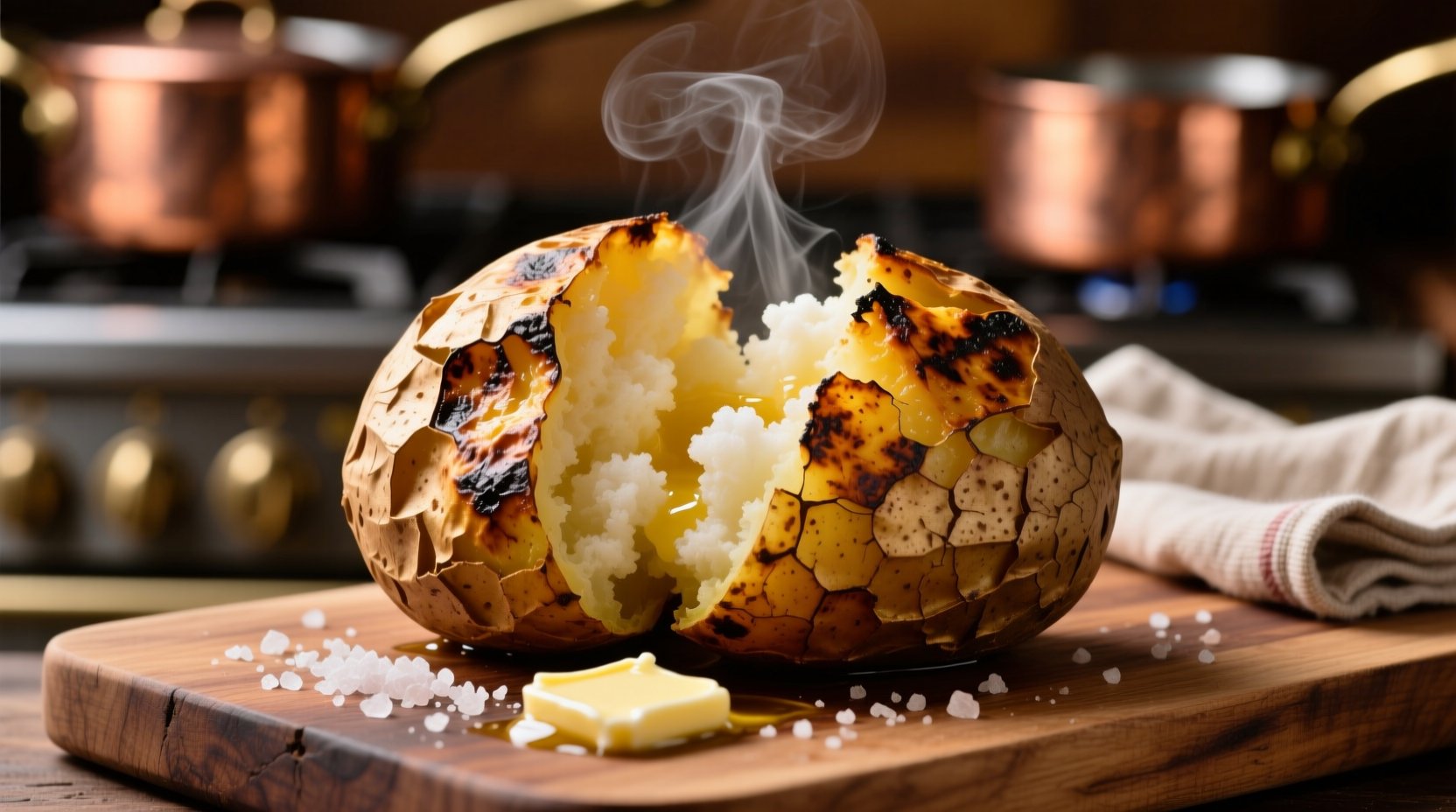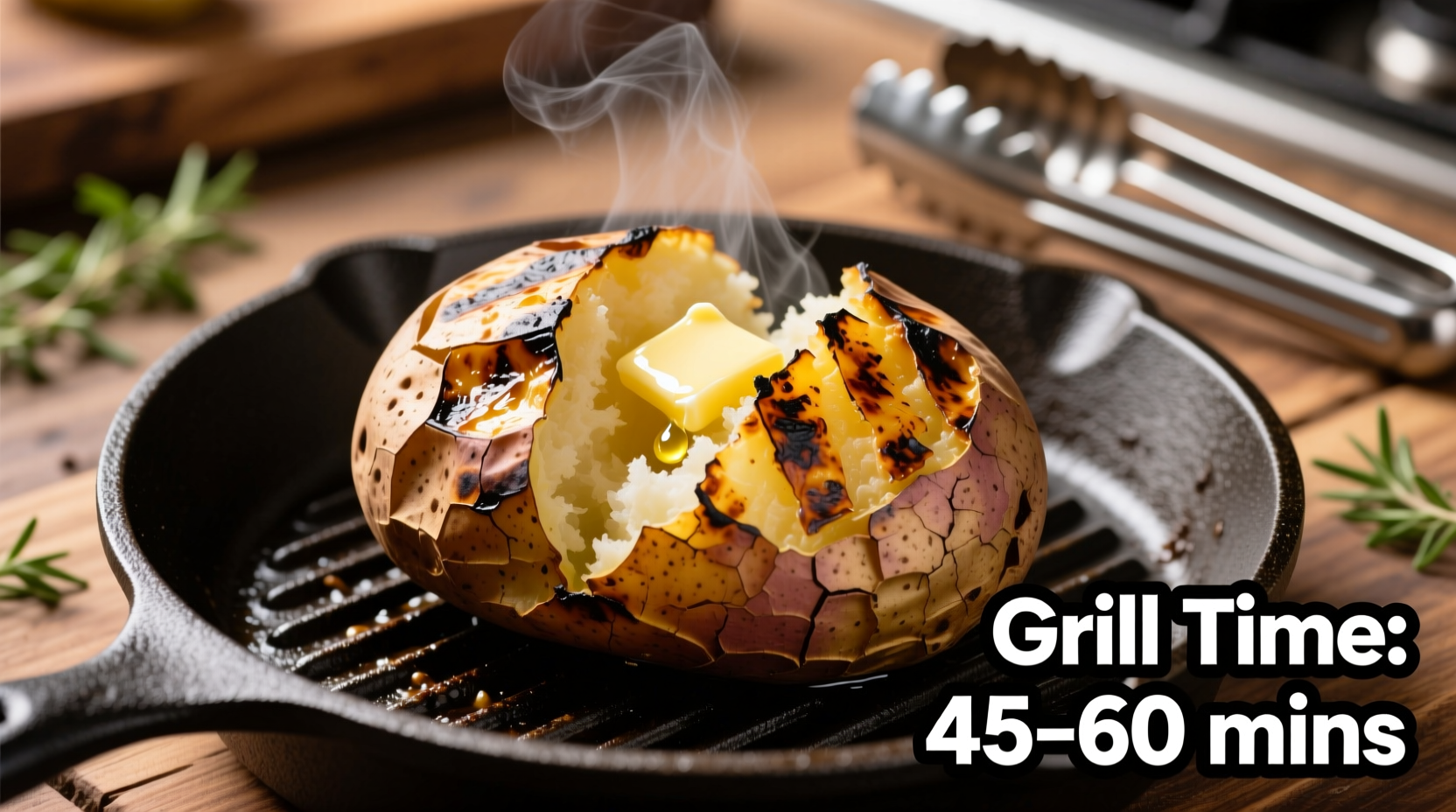Nothing beats the smoky flavor of a perfectly grilled baked potato. Whether you're hosting a backyard barbecue or enjoying a simple weeknight dinner, knowing the precise timing ensures fluffy interiors and crisp skins every time. This guide delivers exact grilling times based on potato size, grill type, and preparation method - no more guessing or ruined dinners.
Why Grilling Beats Oven-Baking for Potatoes
Grilling transforms ordinary potatoes into culinary stars. The direct heat creates a unique texture contrast you can't achieve in an oven: crispy, flavorful skins with a smoky aroma and tender, fluffy interiors. Unlike oven-baking, grilling imparts subtle wood or charcoal notes that elevate this humble side dish into something special.
According to culinary research from the America's Test Kitchen, the Maillard reaction (browning process) occurs more effectively on grills due to radiant heat, creating complex flavor compounds that enhance the potato's natural sweetness.
Step-by-Step Grilling Process
Preparation: Setting Up for Success
Proper preparation determines your potato's final texture. Start with these essential steps:
- Clean thoroughly: Scrub potatoes under cold water to remove dirt (never peel - skins add flavor and nutrients)
- Dry completely: Pat dry with paper towels to ensure crisp skins
- Poke holes: Use a fork to pierce 6-8 times to allow steam to escape
- Oil lightly: Rub with 1 tsp olive oil per potato to prevent sticking
- Season simply: Salt enhances flavor without overpowering the potato's natural taste
Grill Setup: Direct vs. Indirect Heat Methods
Your grill configuration dramatically affects cooking time and results:
| Method | Best For | Temperature | Time Range |
|---|---|---|---|
| Direct Heat | Thin-skinned varieties (Yukon Gold) | 400-450°F | 35-45 minutes |
| Indirect Heat | Thick-skinned varieties (Russet) | 350-375°F | 50-65 minutes |
| Foil Packet | Moisture retention, faster cooking | 375-400°F | 40-55 minutes |
For consistent results, maintain a steady temperature using your grill's vents. Gas grill users should preheat for 10-15 minutes; charcoal users should wait until coals are covered with white ash.

Timing Guidelines by Potato Size
Size matters more than many home cooks realize. These timing guidelines account for common potato weights:
- Small potatoes (4-6 oz): 35-45 minutes - ideal for quick weeknight meals
- Medium potatoes (6-8 oz): 45-55 minutes - the most common size for baking
- Large potatoes (8-10 oz): 50-65 minutes - requires careful monitoring to prevent burning
Food safety experts at the USDA Food Safety and Inspection Service confirm that potatoes are safe to eat when they reach an internal temperature of 205-210°F, which ensures complete starch gelatinization for optimal texture.
Doneness Testing: Beyond Just Timing
While timing provides a good starting point, these visual and tactile cues guarantee perfect results:
- Fork test: A fork should slide in with no resistance
- Squeeze test: Gently squeeze (using tongs) - properly cooked potatoes yield slightly
- Internal temp: 205-210°F at the thickest part (use an instant-read thermometer)
- Skin appearance: Crisp and slightly wrinkled, not burnt or blackened
Common Grilling Mistakes and How to Avoid Them
Timing Adjustments for Different Grill Types
Not all grills perform equally. These adjustments account for equipment differences:
- Charcoal grills: Add 5-10 minutes to standard times due to heat fluctuations
- Gas grills: More consistent heat allows for precise timing adherence
- Smokers: At 275°F, increase time to 60-75 minutes for extra smoky flavor
- Grill baskets: Reduce time by 5-10 minutes as they concentrate heat
Environmental Factors That Affect Cooking Time
External conditions significantly impact grilling duration. Adjust accordingly:
- Cold weather (below 50°F): Add 10-15 minutes to compensate for heat loss
- Windy conditions: Shield the grill or increase cooking time by 5-10 minutes
- High altitude (above 3,000 ft): Water boils at lower temperatures, requiring 10-20% longer cooking
- Rainy/humid days: Expect slightly longer cooking times due to moisture in the air
Pro Tips for Restaurant-Quality Results
Flavor Enhancement Techniques
Elevate your grilled potatoes with these chef-approved methods:
- Pre-soak in salt water: 30 minutes in 1 quart water with 2 tbsp salt improves texture
- Herb infusion: Place rosemary or thyme sprigs under the foil packet
- Post-grill butter bath: Immediately after cooking, brush with herb butter
- Two-stage cooking: Partially bake in oven, then finish on grill for perfect texture
Storage and Reheating Guidelines
Leftover grilled potatoes maintain quality when handled properly:
- Refrigeration: Store in airtight container for up to 4 days
- Freezing: Not recommended as texture deteriorates significantly
- Reheating: Wrap in foil and return to grill for 10-15 minutes at 350°F
- Food safety: Discard if left at room temperature for more than 2 hours
Troubleshooting Common Issues
When Potatoes Cook Unevenly
If your potatoes have hard spots or burnt areas:
- Rotate potatoes 180 degrees every 15 minutes for even exposure
- Move to cooler part of grill if skins are browning too quickly
- Use indirect heat for larger potatoes to prevent exterior burning
- Check grill temperature regularly with an external thermometer
Fixing Undercooked or Overcooked Potatoes
Rescue imperfect potatoes with these techniques:
- Undercooked: Return to grill for 5-10 minute increments until done
- Slightly overcooked: Slice and make grilled potato hash with onions and peppers
- Burnt exterior: Carefully peel off blackened skin before serving
- Dry interior: Mix with sour cream and butter to restore moisture











 浙公网安备
33010002000092号
浙公网安备
33010002000092号 浙B2-20120091-4
浙B2-20120091-4